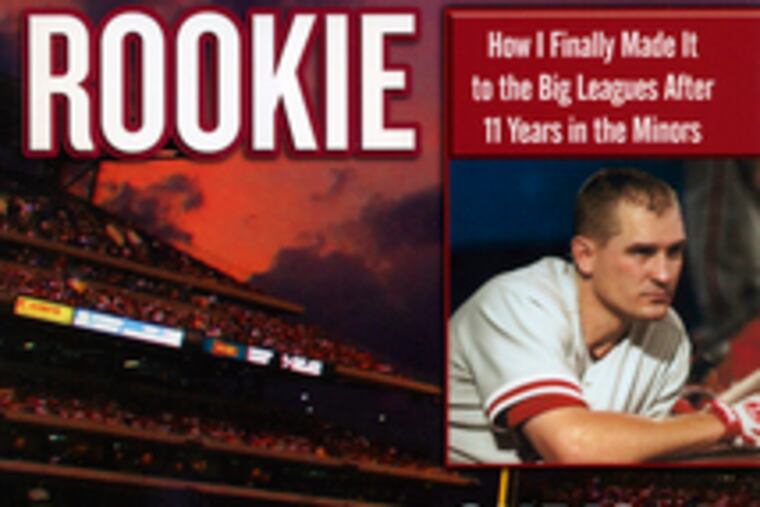
How I Finally Made It
to the Big Leagues
After 11 Years in the Minors
By Chris Coste
Ballantine Books. 224 pp. $25
Reviewed by Jon Caroulis
What's not to love? A hardworking, dedicated man overcomes odds and obstacles to fulfill his dream. And in the city where there's a statue of Rocky!
Chris Coste played 11 years in the minor and independent leagues before reaching "The Show" with the Phillies in 2006. Publishers and film producers called asking for his story - and then the happy ending (and potential movie rights) was snatched away and Coste was sent back to the minors at the start of the 2007 season.
Once again, he beat the odds and returned to help the team reach the postseason for the first time since 1993. And when the Phillies open the 2008 season tomorrow, Coste will be in a big-league uniform.
Now we get the book,
The 33-Year-Old Rookie: How I Finally Made It to the Big Leagues After 11 Years in the Minors
.
This is an engaging if thin account of Coste's life in baseball, starting in school back in North Dakota, college, independent leagues, the minors, and finally the majors. The dominant theme in the book and in Coste's life is:
Give me a chance
. It will strike a sympathetic chord with anyone, baseball fan or not, who has ever suffered the frustration of being rejected without getting a chance to show what he can do. "I'll surprise you," Coste would tell managers, scouts and baseball executives when they told him he had no chance to make the team.
He suffered from two stigmas: By the time he reached 25, he was older than most minor-league players, and he played in leagues unaffiliated with major-league franchises, which stuck him with a sort of label:
Well, if he's so good why is he playing there?
Whenever Coste got a chance, he proved himself - only to suffer another setback and have to start over. None was crueler than the start of the 2006 season.
During spring training, Coste batted .468. He earned the respect of the team's pitchers and was the big story out of camp: the guy who finally made it. He flew up from Florida to Philadelphia with the team, only to find out the next day that the Phils had acquired David Dellucci for outfield depth. Coste was going back to the minors.
Interestingly, he writes that leftfielder Pat Burrell - criticized for years for his seeming lack of on-field emotion - was among his teammates most visibly affected by the demotion.
Six weeks later, a backup player retired and Coste got his chance to return to the Phils. He went hitless in his first 11 at-bats, then started connecting and wound up with a .328 average.
Then, after another good spring training in 2007, he was sent back to the minors again. Fans wondered why. The media wondered why. The best speculation was that someone in the Phils organization thought he was subpar defensively and brought in another catcher. Coste doesn't say anything on this topic - whoever made the decision is still with the team - except that he made it back.
Coste says he wrote the manuscript himself, and he has a folksy, endearing way of telling his stories. He probably had a short window to write the book (and update it), so there are things missing. A line like "At times, I would go up to three months without seeing my wife and daughter" begs for more. And there's too brief a glimpse into his four seasons playing winter ball in Mexico, Panama and Venezuela.
Coste isn't the "oldest" rookie to make it to the majors. That honor probably goes to Satchel Paige, who was in his 40s (at least) when he pitched for Cleveland in 1948.
But if he's not the oldest, he's certainly one of the most likable. Kudos to Coste - and his wife and family - for sticking to it. As one of his supporters, manager Charlie Manuel, says, "He was born to play in a city like Philly. . . . Chris Coste is definitely a Philly kind of guy."